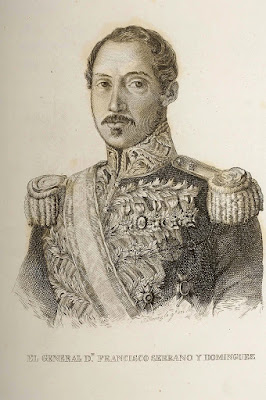July 16, 2013
San Pedro de Abanto I: The weeks leading up to
the battle.
On 27 February 1874, Antonio López departed on a
special train from Granada to join the Army Operations North. My
great-great-grandfather was twenty years old and the military life was his only
path to prosperity. His departure from his home, a village on the plain of
Granada, coincided with bad news from the northern front. General Morriones and
the twenty-five thousand strong Liberal army, tasked with lifting the Carlist
siege of Bilbao, had been repulsed after two days of fighting. The Liberals
suffered over a thousand killed and countless wounded.
 |
| General Domingo Morriones |
Morriones, aware of the impossibility of the
endeavor, had just sent a telegram: "Unable to break the enemy's line.
Send reinforcements and another commander." In Madrid, the telegram
produced an enormous uneasiness. General Serrano decided to resign the
Presidency to take charge of the military operations. At that time, the civil
war had lasted two years and its outcome remained uncertain. The Carlists
continued to besiege Bilbao and tried to conquer it, despite the impossibility
of their goal. Taking Bilbao was an old Carlist obsession; they had already
tried it during the First Carlist War. Now, just as before, the Carlists sought
to access Bilbao’s resources and obtain a success that legitimized Don Carlos’
claim to the throne in front of international powers. The pretender refused to
accept the first republican government in Spanish history, which had been
established after the abdication of Amadeus of Savoy.
Antonio had not forgotten the moment of his
enlistment in the army, just two weeks earlier: exactly a year after the
foundation of the Republic. Hounded and already mortally wounded, the Republic
would limp on another ten months before finally expiring. The desperate
financial situation—an enormous budget deficit and large payments immediately
due to creditors—and the ensuing political instability had led to rising
unemployment, hunger and unrest in the countryside. Benito Perez Galdos
described the situation in his National Episodes: "the ungodly
civil war, nefarious monster that showed me only her painful limbs. Two armies,
two military families, equally impassioned and heroic, tore themselves apart
for a throne and an altar. It would be difficult to say which of the two aged
furnishings was more severely battered and bloodied by the fight. In the annals
of world history, quarrels and a race’s pursuit of an ideal appear noble.
Conflicts as vain and stupid as Spain saw and withstood during the nineteenth
century, justified by illusory familial inheritance rights and scraps of a
Constitution, ought appear only in the history of cockfights.”
After
five days’ travel by train, Antonio arrived in Santander. The city had been
converted into a huge military camp, where reinforcements mingled with those
wounded in the previous battle. Four days later, on March 7, Antonio departed
for the front lines at Santoña.
The cover of the contemporary edition of Spanish
and American Illustration amply demonstrates the national crisis which
Spain was enduring. The caption reads: "We would prefer to introduce this
magazine by announcing a great and fortunate event of those which the country
has been awaiting with growing anxiety [...] we will have to delay a few days.
Impatience devours us in anticipation of upcoming developments that will free
our country from a harrowing and fratricidal war.”
Antonio was one of twenty thousand men that
Serrano had under his command. Their regiment, the Eighth Infantry of Zamora, 2nd
Battalion, was part of the Colonel Fajardo’s 1st Brigade, which was
encompassed in the 1st Division commanded by General Andía, which in
turn formed, along with sixteen battalions, the 2nd Corps of Field
Marshal Primo de Rivera.
The aftermath of the previous defeat was
immediately apparent to the soldiers. The rest of the country could get an
impression through the drawings published in Spanish and American
Illustration. One image of a field hospital was described as follows:
"It was necessary to convert the parish church of Somorrostro into a vast
field hospital, whose atmosphere stamped a profound impression of grief and
bitterness into the soul. There was a dreadful muddle between objects of
worship and those belonging to the Military Health Service. The pavement was
covered with straw and crowded with mattresses that had been commandeered from
the population. In them lay those unfortunate enough to have been more or less
severely wounded. Some complained plaintively, others shouted desperately, no
few were already immobile, with blank stares."
Field hospital at Somorrostro, drawn by José Luis Pellicer for the March 22, 1874 edition of Spanisand American Illustration
The
magazine also included an explosion which had occurred a few days earlier in
front of the Church of St. John: "Suddenly a vivid flash outshined daylight
for a moment, and a horrible sound reverberated. One of the aforementioned
wagons was filled with two large drawers of powder and no small amount of
loaded fuses and detonators. It had burst into flames, causing a horrific
explosion. Overcome by panic, the soldiers fled. Alas, many unfortunates fell
victim of this unexpected event, which was of the magnitude of a true
catastrophe.”
However, the battle had not even started, and the
worst was yet to come.
English translation by Katya Anderson of the spanish text:

dormidasenelcajondelolvido by José María Velasco is licensed under a Creative Commons Reconocimiento-No comercial-Sin obras derivadas 3.0 España License.









